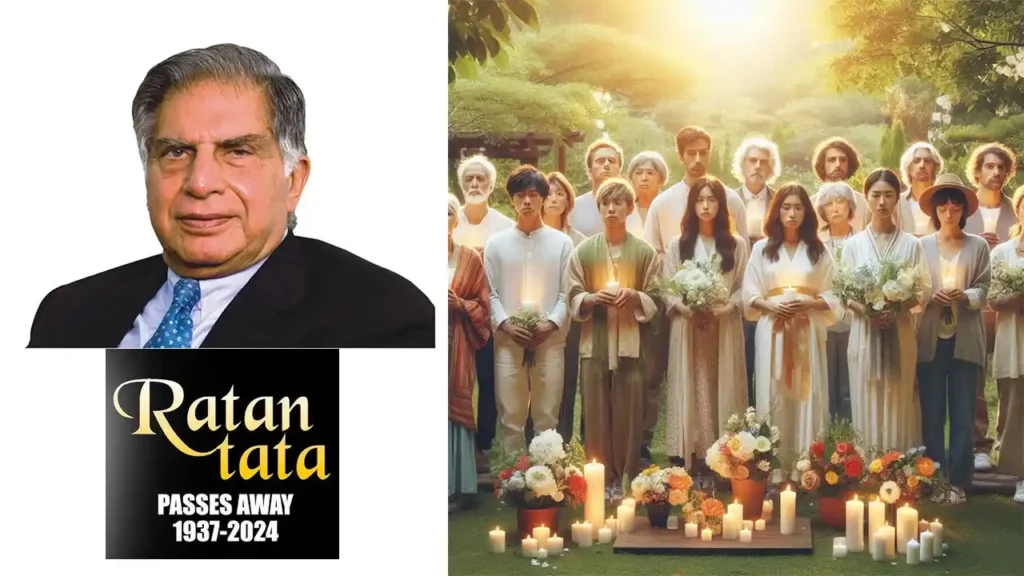Ratan Tata Dies at 86: End of an Era for Indian Industry
On October 9, 2024, Ratan Tata Died at the age of 86, leaving behind a lasting legacy that shaped India’s industrial landscape. His remarkable journey as the chairman of Tata Group, his philosophy of giving back, and his humble nature endeared him to millions. His death has sent ripples across the nation, and the question arises, what comes next after the passing of such a monumental figure?
Age of Ratan Tata
Ratan Tata, born on December 28, 1937, lived to be 86 years old. Over his extensive career, he not only built an industrial empire but also became a global ambassador for Indian business. His longevity allowed him to witness and actively contribute to the technological and economic transformations of India.
Biography of Ratan Tata
Ratan Tata was born into the Tata family, one of the most prominent business families in India. Raised by his grandmother after his parents separated, Tata received his education from Cornell University, where he initially studied architecture, before transitioning into business. He joined the Tata Group in 1961, beginning his career on the shop floor of Tata Steel, which instilled in him a sense of humility and practical leadership. Over time, he took on more prominent roles within the company, eventually succeeding J.R.D. Tata as chairman in 1991. Under his leadership, Tata Group flourished, going global with landmark acquisitions such as Jaguar Land Rover and Corus Steel. His commitment to ethical business practices and philanthropy earned him respect both in India and around the world.
Ratan Tata Born Place
Ratan Tata was born in Mumbai, India’s financial capital, on December 28, 1937. Mumbai’s cosmopolitan environment and bustling business culture played a significant role in shaping Tata’s global perspective and understanding of industry. His early life in this vibrant city influenced his later work and leadership style.
Did Ratan Tata Get Married?
Ratan Tata never married. In interviews, he has mentioned being close to marriage several times but ultimately did not go through with it due to various circumstances. Despite this, he has always valued personal relationships and friendships, leading a private yet meaningful life.
Who Owns Tata Sons?
Tata Sons, the principal holding company of the Tata Group, is largely controlled by charitable trusts, primarily the Tata Trusts, which together own about 66% of the equity. The Tata family and the company’s executives have minimal ownership of the remaining shares. Ratan Tata himself played a key role in ensuring the continued philanthropic direction of the company through these trusts.
Ratan Tata Death Today: The End of an Era
Ratan Tata passed away on October 9, 2024, after battling health issues related to age. His passing was confirmed in the evening, and it marked the end of a life dedicated to serving the nation through both business and philanthropy. Tata was undergoing treatment at Breach Candy Hospital in Mumbai, where he had been receiving intensive care.
Ratan Tata Death Cause
Ratan Tata’s death was due to age-related complications. In recent months, his health had been fragile, and he had been admitted to the hospital several times for various ailments. Despite the best medical care, his body succumbed to these health issues after a long battle.
Ratan Tata Death Exact Time
Ratan Tata passed away around 9 PM IST on October 9, 2024, at Breach Candy Hospital in Mumbai. His death was met with an immediate outpouring of grief from across India and beyond, as his contributions to the nation and global industry were remembered.
Why Is Tata Not the Richest?
Despite the success of the Tata Group, Ratan Tata himself is not among the wealthiest individuals. This is primarily because the majority of the shares of Tata Sons are held by charitable trusts, which use the profits to fund education, healthcare, and other charitable causes. This structure means that while the Tata Group is highly profitable, Ratan Tata’s personal wealth is relatively modest compared to other industrial magnates.
Total Property Value of Ratan Tata
Ratan Tata’s personal net worth has always been a topic of discussion, but it is generally modest compared to other business leaders, estimated to be around $1 billion. This is primarily due to his commitment to philanthropy. The Tata family’s wealth is not concentrated in personal assets but is directed through Tata Trusts, which hold significant stakes in the Tata Group and use profits for charitable activities.
Ratan Tata Death Holiday
There have been discussions about declaring a national day of mourning in honor of Ratan Tata, given his immense contributions to India’s growth and welfare. As of now, no official public holiday has been declared, but memorials and tributes are expected to continue for some time, reflecting the nation’s deep respect for Tata’s life and work.
What Happened to Ratan Tata?
Ratan Tata passed away after a period of declining health. His death occurred in Mumbai, where he had been hospitalized at Breach Candy Hospital. His passing marks a moment of reflection for the country, as Tata was not only a businessman but a national icon.
Who Is Next After Ratan Tata?
The leadership structure of Tata Group is well established. After Ratan Tata’s retirement in 2012, Cyrus Mistry took over as chairman, though he was later replaced by Natarajan Chandrasekaran in 2017. Chandrasekaran is the current chairman of Tata Sons and is expected to continue leading the company after Tata’s passing. While no direct successor has been named in terms of personal leadership, Tata’s legacy will be carried forward by the strong institutional framework he helped build.
What After Ratan Tata’s Death?
After Ratan Tata’s death Rip, the Tata Group will continue to operate under its current leadership. However, his passing is likely to bring a renewed focus on his philanthropic initiatives and the role of the Tata Trusts in shaping India’s future. Tata’s influence extends far beyond the boardroom, and his death may spark increased interest in social causes, particularly in areas like healthcare, education, and rural development, which he prioritized throughout his life.
Ratan Tata Death Time and Date
Ratan Tata passed away on the evening of October 9, 2024, at approximately 9 PM IST. The news of his death was confirmed shortly thereafter, and tributes poured in from all corners of the globe. His death marks the end of a storied life, but his legacy of ethical business, philanthropy, and leadership will live on for generations.
Ratan Tata’s Contributions to the Indian Nation
Ratan Tata’s impact on India extends across multiple domains, including industrial growth, philanthropy, and social responsibility. His contributions have touched the lives of millions, helping build a stronger, more self-reliant nation. Below is a detailed look at some of his most significant contributions:
| Domain | Contributions | Impact |
|---|---|---|
| Industrial Growth | Global expansion of Tata Group, acquisitions of Jaguar Land Rover and Corus Steel | Established Tata Group as a global industrial powerhouse, boosting India’s global reputation. |
| Affordable Innovation | Launch of Tata Nano, the world’s cheapest car | Aimed to provide affordable mobility for the Indian middle class and promoted cost-effective engineering solutions. |
| Healthcare | Supported Tata Memorial Hospital, cancer care initiatives | Provided affordable cancer treatment and medical care to millions of underprivileged patients across India. |
| Education | Founding of Tata Institute of Social Sciences, support for Indian Institute of Science | Enhanced higher education and research in India, nurturing talent and innovation in science, technology, and social studies. |
| Rural Development | Tata Trusts’ contributions to rural infrastructure, education, and livelihood projects | Improved quality of life in rural areas, reducing poverty, and promoting sustainable development in underserved communities. |
| Corporate Social Responsibility | Focus on environmental sustainability, renewable energy projects | Encouraged eco-friendly practices, contributing to a greener India while promoting corporate social responsibility. |
| Philanthropy | Major funding through Tata Trusts for healthcare, education, and social welfare projects | Donations and initiatives have benefited millions in areas like health, education, and disaster relief. |
Industrial Growth and Globalization
Ratan Tata’s leadership transformed the Tata Group into a global brand. Under his guidance, the company expanded its reach through significant international acquisitions, including Jaguar Land Rover (2008) and Corus Steel (2007). These acquisitions not only brought advanced technology and management practices to India but also positioned Tata Group as a major global player in industries like automotive, steel, and technology.
Ratan Tata was a firm believer in India’s potential to compete on the world stage. By acquiring foreign companies, he ensured that Indian industries could engage with the global market, creating jobs, and enhancing India’s industrial capabilities.
Affordable Innovation: Tata Nano
One of Ratan Tata’s most famous initiatives was the creation of the Tata Nano, the world’s most affordable car. Launched in 2009, the Nano was envisioned as a “people’s car,” priced low enough to make personal transportation accessible to India’s middle and lower classes. While the car faced challenges in the market, it represented Tata’s commitment to frugal innovation and his ambition to provide solutions tailored to the needs of ordinary Indians.
Philanthropy: Healthcare and Education
Ratan Tata’s philanthropic work is just as monumental as his business achievements. Much of his personal wealth, as well as the profits from Tata Sons, were channeled into charitable efforts via the Tata Trusts. These trusts, which hold around 66% of Tata Sons’ equity, fund initiatives in healthcare, education, and social welfare.
- Healthcare: The Tata Memorial Hospital in Mumbai is a leading cancer care center in India, offering free or low-cost treatment to thousands of patients each year. Through his leadership, Tata Trusts have also supported other health initiatives, including mobile clinics and public health campaigns.
- Education: Tata Trusts have been instrumental in funding educational institutions such as the Tata Institute of Social Sciences and the Indian Institute of Science. These institutions have played key roles in shaping India’s scientific, social, and technological advancements, making education accessible to a broader population.
Rural Development
Ratan Tata believed in uplifting the rural sections of India. Through Tata Trusts and various Tata companies, he contributed significantly to improving rural infrastructure, livelihoods, and access to basic services like water and sanitation. Programs were designed to enhance the agricultural productivity of small farmers, promote rural entrepreneurship, and improve educational outcomes in rural areas.
Corporate Social Responsibility and Sustainability
Environmental sustainability was another key focus for Ratan Tata. He led efforts within Tata Group to incorporate eco-friendly practices, from renewable energy projects to water conservation and pollution control. His vision for Tata Power’s ventures into wind and solar energy positioned the company as a leader in India’s renewable energy sector.
Incorporating sustainability into the Tata business model reflected Tata’s belief that industry and nature should coexist harmoniously. He was a proponent of businesses being responsible not just to shareholders but also to society and the environment.
Philanthropic Legacy and Future of Tata Trusts
Ratan Tata’s lasting legacy lies in the continued work of Tata Trusts. Under his leadership, the Trusts took on numerous charitable initiatives, from disaster relief to educational scholarships and healthcare infrastructure. After his passing, these initiatives will continue, ensuring that his commitment to improving the lives of millions remains intact.
A Lifelong Commitment to India
Ratan Tata’s contributions have been instrumental in shaping modern India. His leadership at Tata Group, pioneering affordable innovations, commitment to philanthropy, and unwavering dedication to improving the lives of India’s underserved populations have made him an enduring figure of national significance. Whether in the boardroom or in rural villages, Tata’s influence will continue to be felt long after his passing.
Conclusion: Ratan Tata’s Enduring Legacy
Ratan Tata’s death signifies the end of an era for India and the world. His impact on the global business landscape, as well as his philanthropic contributions, are immeasurable. Known for his humility and far-sightedness, Tata ensured that the Tata Group remained focused on giving back to society while building one of the world’s most respected industrial conglomerates.
Although Tata is no longer with us, his vision will continue to guide the company and inspire leaders across industries. His commitment to ethical leadership, philanthropy, and innovation will be remembered as one of his most enduring legacies.
FAQs
Did Ratan Tata get married?
No, Ratan Tata never married, though he has mentioned being close to it on a few occasions.
Who owns Tata Sons?
Tata Sons is largely owned by Tata Trusts, which hold about 66% of the company’s shares.
Why is Tata not the richest?
Most of Tata Sons’ profits go to charitable trusts, not personal wealth accumulation, which is why Ratan Tata is not among the richest.
What is the total property value of Ratan Tata?
Ratan Tata’s estimated personal net worth is around $1 billion, modest due to his philanthropic focus.
Who is next after Ratan Tata?
After Ratan Tata’s retirement, Natarajan Chandrasekaran is the current chairman of Tata Sons.
What is Ratan Tata’s death cause?
Ratan Tata died due to age-related health issues after months of treatment.
How much of Tata Sons is owned by Tata Trusts?
Around 66% of Tata Sons is owned by Tata Trusts, ensuring profits benefit charitable causes.



